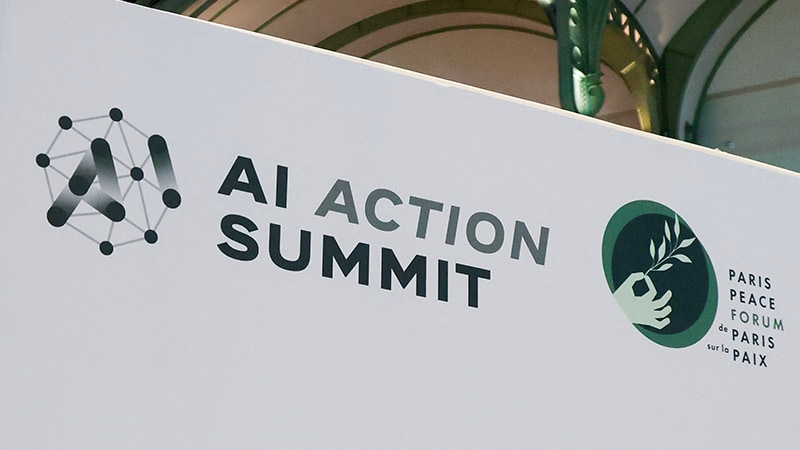[ad_1]
France is accelerating its adoption of artificial intelligence (AI) in healthcare, with plans to train 100,000 caregivers annually and build Europe’s largest AI-focused data centre. The government aims to develop a national roadmap to drive innovation and ensure ethical AI use in healthcare.
The AI Action Summit was held on 10th and 11th February in Paris, France, bringing together government leaders, institutions, and health technology experts. On the eve of the summit, French President Emmanuel Macron spoke on the public television channel France 2’s 8 PM news, calling AI a “technological revolution.”
“This new era of progress will allow us to live better, learn better, and provide better care,” Macron said. Macron highlighted several examples of AI’s expected impact on healthcare. At the Gustave Roussy Cancer Centre, Paris, France, AI is enabling faster and more precise tumour detection. It is also being used to assess new treatments through digital twins and to enhance mobility with Wandercraft’s Personal Exoskeleton.
“Thanks to AI in medicine, we prevent better, detect better, and treat more precisely,” said Macron.
France’s AI Ambitions
The summit reinforced France’s ambitious goals for AI development, positioning it as a key player in the global race for technological advancement. Above all, AI is seen as a crucial factor in securing digital sovereignty. Despite significant national debt exceeding €3000 billion, France aims to compete with more advanced American and Chinese tech giants.
Following the announcement of the Stargate Project, a $500 billion AI investment plan in the United States, and the emergence of DeepSeek, a Chinese start-up developing a ChatGPT competitor, France is also making bold moves in the AI sector. The country will receive €109 billion in investments, mostly from foreign sources.
A key announcement from the summit was the upcoming construction of massive data centres in France. The United Arab Emirates will invest €50 billion in an “AI-driven campus,” the location of which is yet to be decided. This facility, expected to be the largest in Europe, will have a computing capacity of up to 1 GW, equivalent to the power output of a pressurised water nuclear reactor.
Additional funding includes €20 billion from Canadian investors, up to €20 billion from American investors, and contributions from Japanese, British, and Swedish companies. Several billion euros are expected from French firms, including French Iliad, Orange, Thales, and Mistral AI, which recently launched the AI assistant Le Chat.
While much of the focus on AI revolves around technology and infrastructure, healthcare is expected to be a primary beneficiary of future AI-powered data centres. The French Ministry of Health announced plans for an “ambitious and inclusive” strategic AI roadmap focused on real-world healthcare applications.
Training and Adoption
To accelerate AI adoption in medicine, the French government is making digital training in AI mandatory for first-year healthcare students starting in the 2025 academic year. A total of €119 million are being invested to train 500,000 professionals in 5 years, covering medical, paramedical, and social staff, as well as digital health engineers.
Practising physicians will be encouraged to integrate AI into clinical practice. In 2025, an initiative led by the French National Health Insurance Fund and the French National Authority for Health will evaluate the medico-economic impact of AI-assisted ECG interpretation to support general practitioners.
To monitor AI deployment in healthcare, an observatory for AI applications will be established. This initiative aims to track AI implementation, identify barriers to adoption, and facilitate its responsible integration into the health system.
Environmental Concerns
While AI offers significant potential to enhance prevention, diagnostics, and medical care, its environmental impact is a growing concern. Experts warn that large-scale AI adoption could lead to excessive energy consumption.
A 2023 Deloitte report estimated that data centres accounted for 1.4% of global electricity consumption, a figure expected to rise to 3% by 2030. AI also requires significant water and rare metal resources, raising sustainability concerns.
Recognising this challenge, France’s Ministry of Ecological Transition has pledged to promote “frugal AI” — a more energy-efficient approach to AI development.
Ethics
France, China, and India advocated for ethical AI at the summit, although the United States and the United Kingdom remained neutral. Despite Macron’s call for global AI regulation, enforcing compliance among tech giants like OpenAI, Microsoft, and Google — which lead AI innovation — remains difficult, as their home countries seek to protect them from restrictive policies.
From a patient advocacy perspective, concerns about AI ethics and transparency persist. France Assos Santé, a leading patient rights association, voiced its apprehensions in a manifesto.
France Assos Santé, a patient rights association, raised concerns in a manifesto, stating that AI algorithms lack sufficient transparency. The organisation calls for stronger safeguards to ensure AI is used equitably, without reinforcing biases or limiting accessibility.
“AI can do a lot for healthcare, but it is not sufficient on its own,” France Assos Santé emphasised. “It must remain a tool to serve patients, with its use driven by constructive dialogue rather than a blind race for innovation.”
This story was translated and adapted from Medscape’s French edition using several editorial tools, including AI, as part of the process. Human editors reviewed this content before publication.
[ad_2]
Source link : https://www.medscape.com/viewarticle/france-bets-medical-ai-train-100-000-doctors-yearly-2025a10004oh?src=rss
Author :
Publish date : 2025-02-24 04:43:21
Copyright for syndicated content belongs to the linked Source.
